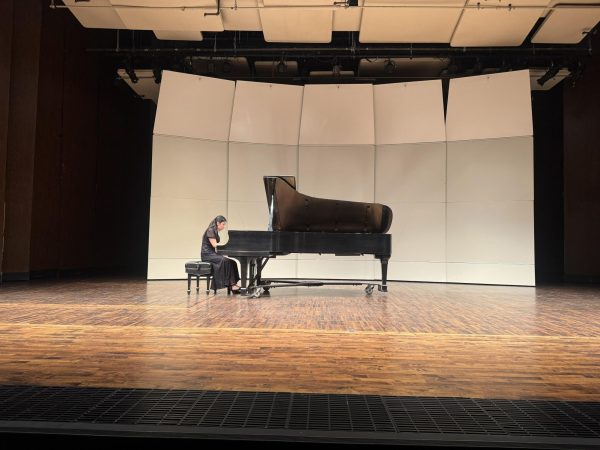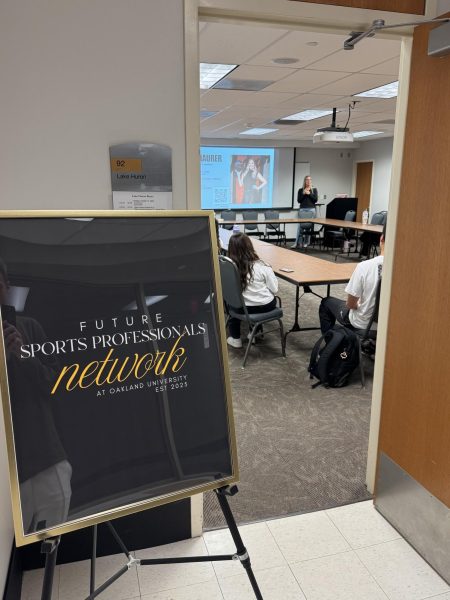New faculty contract: bargaining results, what concessions were made, looking ahead

Photo courtesy of Oakland University
After more than three months of bargaining, four deadlines extensions, a work stoppage that delayed the start of the semester, two days of picketing and a march through the heart of OU by picketers — an agreement was reached between the administration’s bargaining team and Oakland University’s Chapter of the American Association of University Professors (OU AAUP) at 12:20 a.m. last Saturday.
The tentative agreement is a three-year contract, set to expire Aug. 14, 2024. Its arrival marked the beginning of the fall semester and a collective sigh of relief from a campus community hungry to get back in the classroom for the first time since the beginning of COVID-19.
OU AAUP President Karen Miller released the following statement regarding the agreement and the support faculty received from the campus community in the final weeks of bargaining.
“I would like to thank the Bargaining Team for their efforts in what was an extraordinarily difficult negotiation cycle; they did a wonderful job,” Miller said. “I would like to thank all those who helped to organize our communications efforts; they crafted an incredibly successful campaign to explain the ever changing bargaining situation to both our members and the community around us. I would like to thank those who helped organize our job action; they rallied the community and reminded us of the joy we have for each other and our profession. I am grateful to have been the president of such an outstanding group of people. I could not be more proud of the faculty at Oakland University.”
The agreement was hard fought by both sides and the numbers that have been released by OU AAUP reflect that. Major issues in the final days of bargaining included — healthcare benefits, faculty tuition waivers, pay for summer courses, processes for hiring/firing and compensation for special lecturers.
According to the agreement summary released to OU AAUP members Sunday afternoon, in the new agreement pay raises for full-time faculty have been set at 1.25% increase with a $500 bonus in year one, a 1.85% increase in year two and a 2% increase in year three. All raises are based on merit, which means faculty must complete certain procedures to be eligible for the raise. These numbers fall between the 3.5% originally proposed by faculty and 0% followed by 1% in subsequent years proposed by the administration.
Additionally, employer healthcare contributions for full-time faculty will be 95% in years one and two, and 90% in year three of the agreement. This is in contrast to the initial economic proposal from the administration that saw OU contributing 90% year one, 85% in year two and 80% in year three.
With retirement contributions, contributions schedules will remain the same for all existing full-time faculty. Employer contributions for faculty hired after Sept. 1, 2021 is set at 11% starting after one year of service. Available retirement plans will be selected by the fiduciary advised by an Investment Committee. OU AAUP will now appoint one non-voting member to that committee.
The formula for full-time faculty will remain the same as the prior agreement, with a cap at $11,000 for a four credit course. This is significant because the university’s initial proposal ditched the formula in favor of a flat-per-credit-hour rate which would have been considerably lower for some faculty.
In the new agreement — upon birthing, adopting or fostering a new child, full-time faculty are eligible for up to 12 weeks of paid parental leave. Additionally, the faculty tuition benefit will remain at current levels of 10%. Though, there are some restrictions for receiving the benefit — like the benefit can only be used for “regularly admitted students degree-seeking or certificate programs or guest students,” and that it can only be used once for repeat courses.
Throughout the bargaining process, OU AAUP fought for specificity in language and procedures and ultimately succeeded on that front in several areas. Improving processes for hiring and firing faculty was one such area.
Procedures enabling due process have been created for when a faculty member is removed from campus, changes have been made to when layoffs can be initiated, language has been added so that the administration must seek to use attrition when addressing overstaffing, position shift layoff has been eliminated and laid off faculty will retain their OU email and electronic access to personal documents.
Additionally, OU AAUP fought for protections for Special Lecturers (SLs), a sub-group of faculty who teach a significant portion of the courses at OU. Under the new agreement, SLs who teach at least 16 credit hours in a year will receive a $500 stipend. Additionally, after eight years of service, SLs will now be offered three-year contracts. And the faculty tuition benefit for SLs has been increased from 10 to 12 credits. Employer healthcare contributions for SLs will remain the same, with SLs paying about 35% of their benefit. Salary for SLs will improve at the same rate as full-time faculty.
With negotiations now settled, President Ora Hirsch Pescovitz gave The Post the following statement looking ahead at the fall semester.
“On September 4, 2021, Oakland University reached a contract settlement with the OU Chapter of the American Association of University Professors (AAUP). We respect the diligence, dedication, and passion of those who negotiated on behalf of the OU administration and AAUP. The new contract reflects good-faith negotiations and represents a fair and equitable agreement. We look forward to the faculty taking all necessary and feasible steps to make sure students receive the course content, learning objectives, and support needed to succeed academically.
As we move ahead, we look forward to working together with AAUP as we plan and respond strategically to the many challenges facing OU and other higher education institutions across the country. In the upcoming days and months, we must find common ground in the values, priorities and mission we share.
The demands, uncertainty and challenges of the last year-and-a-half of the pandemic have tested our resolve. As we make the transition to the fall semester, let’s all take the opportunity to do our part in providing the best possible educational experience for our OU students.”








Anonymous • Sep 10, 2021 at 1:52 PM
“In the upcoming days and months, we must find common ground in the values, priorities and mission we share.” First of all, this is either redundant or inconsistent: if we share those values and priorities, then we have already found that common ground; if we are yet to find it, then we don’t share those values and priorities. As such, this statement is meaningless. Furthermore, these negotiations, radio silence of the Office, and the underwhelming agreement indicate that lip service apart, the President’s values and priorities are orthogonal to those of faculty and students.
Anonymous • Sep 9, 2021 at 5:52 PM
There is a reason many faculty are unhappy with this tentative agreement. We’ll see if a majority can be persuaded to accept this. I’m hearing specific complaints about the following:
Special Lecturers have a percent increase in pay, but their pay is so extremely low that the percentage increase will barely amount to anything. And Special Lecturers will still pay an incredibly large percentage of their healthcare premiums, have no life insurance from the university, and have no contributions to retirement at all. Special Lecturers still feel like the underclass of academia even though we’re a third of the faculty.
New rules about layoffs focus on faculty, who do the actual work of the university. There is nothing that says the university will freeze administrative hiring before any layoffs are contemplated (we have more vice presidents than Michigan State), and nothing in the contract addresses these endless construction projects on campus. Some of our students are new and the pandemic has affected on campus activities for a while but, believe me, a year doesn’t go by where we’re not building or rebuilding something on campus.
Finally, new hires are expected to take 3% less for retirement than existing faculty. We see what the administration is trying to do, dividing us up like that. There’s a reason you students came up with “OK, Boomer”. The generation before owes something to the generation to follow, and Boomers didn’t do a very good job with that. We have to keep teaching a viable profession for you students. Many, if not most, faculty know that it’s wrong to ask future teachers to take less.